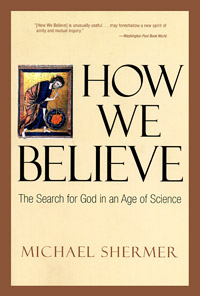There is a common theme that has been popping its head up lately. It seems that in many of the conversations I've been having lately I've been dealing with people who have a limited horizon. The things that are right in front of them so skew their perspective that they react as if those immediate things are the only things that are real. Once this topic came up in the context of evolution and another time it came up in reference to global warming. In both of these cases and in others I find that I tend to give more credence to the position that has a broader horizon.
This analogy is not mine. It's one that has been brought up in a few of the books that I've been reading. We are slaves to the middle world. Humans have a hard time dealing with the really big and the really small. So we tend to think that the more familiar things are more real. Its hard for us to understand the microscopic units of time like nanoseconds. It is just as hard for us to understand the macroscopic concept of the universe being 4.6 billion years old. It's just too hard for us to comprehend. So, it's not surprising that people revert to the more comfortable age of the universe of 6000 years. It's within our limited horizon.
There are a few people here on this Earth who still think that the world is flat. This is because their horizon is limited. What they can see appears flat so they think that applies to what they can't see as well. The Earth is not flat. All we need to do to see this is to step back, or in this case up, from the situation just a little bit. All too often we allow our emotional response to what is immediately before our eyes to cause us to to interpret our perception as absolute fact.
This same argument follows for the idea of global warming. If we just look at the recent trends we can make claims that it isn't happening, that it is happening but it's not caused by man, or even that humans putting carbon into the air is good for the planet. All of these arguments are based on limited horizons. Without stepping back and seeing the big picture it's hard to see the long term trend.
One of the tough parts about basing my opinions on logic, facts and reason is that occasionally the facts are going to confront my opinions and force an uncomfortable dilemma. Do I stick to my a priori opinions or do adjust them to meet the facts? It's not easy to make these adjustments, but as tough as it is I prefer it to dogma.
A case in point for me is the claim that nuclear weapons have made the world safer. I despise the idea of warfare in general and nuclear weapons specifically. I believe they are anathema to how people should be treating each other and solving their disagreements. A few years ago I read a claim that the percentage of deaths due to warfare has gone dramatically down since 1945. Many use this as evidence that Nuclear weapons have brought more peace than they have destruction. My gut instinct is to reject his data but the evidence is pretty compelling. If I expand my horizon beyond the immediate gut reaction the facts will be allowed to speak for themselves.
I really wish that those who confront me about my opinions would have a similar approach to accepting fact without ideological requirements and just judging the facts themselves.
For the record, I still despise warfare and think that eventually we should be able to deal peacefully with each other without such crude tools. It's still uncomfortable to admit some of the facts but, I don't try to deny them.
RFK Jr. is definitely coming for your vaccines (part 6): Liability, ethics,
and policy-based evidence making
-
As 2026 dawns, look for HHS Secretary Robert F. Kennedy Jr. to ramp up his
assault on vaccines using policy-based evidence making and altering Vaccine
Co...
9 hours ago









